
The International Court of Justice ruled Wednesday that Israel, as an occupying power, must allow United Nations humanitarian aid into Gaza and may not use starvation as a method of warfare. In its advisory opinion, the World Court also found that Israel had failed to provide evidence for its claims that UNRWA, the U.N. agency for Palestinian refugees, lacks neutrality or that a significant number of its staff are affiliated with Hamas. Israel denounced the ruling and said it would not comply with the court’s instructions. The Trump administration also condemned the opinion.
“The opinion is unambiguous. It’s an opinion by the highest legal authority of the U.N.,” says UNRWA spokesperson Tamara Alrifai, speaking to Democracy Now! from Amman, Jordan. She adds that for the Trump-backed ceasefire to succeed, aid groups must have unrestricted access to Gaza and be allowed to “flood” the territory with food and other basic supplies.
Transcript
NERMEEN SHAIKH: The International Court of Justice has ruled that Israel, as an occupying power, must allow U.N. aid into Gaza and that Israel cannot use starvation as a method of warfare. Yuji Iwasawa, the president of the International Court of Justice, read the ruling Wednesday.
JUDGE YUJI IWASAWA: The court considers that Israel is under an obligation to agree to and facilitate relief schemes provided by the United Nations and its entities, including UNRWA.
NERMEEN SHAIKH: U.N. Secretary-General António Guterres said, “This is a very important decision, and I hope Israel will abide by it.” This is Paul Reichler, one of the attorneys representing Palestine at the ICJ.
PAUL REICHLER: So, on the one hand, you have the court finding that starvation as a method — of civilians as a method of warfare is illegal. It’s prohibited. And on the other, the court found that Israel deliberately prevented food from reaching the civilian population in Gaza. I don’t see how a reasonable person, certainly acting in good faith, could then say that Israel has complied with its international legal obligations. Plainly, it has not.
AMY GOODMAN: Israel condemned Wednesday’s ruling and said it would not abide by the court’s instructions. The Trump administration also condemned the opinion.
We go now to Amman, Jordan, to speak with Tamara Alrifai. She is spokesperson and director of external relations for UNRWA, the United Nations agency for Palestine refugees.
Welcome back to Democracy Now!, Tamara. Can you describe what’s happening on the ground? How much aid, how many trucks is Israel allowing in? And what about UNRWA in particular, which it has banned?
TAMARA ALRIFAI: The most important thing for us as UNRWA to reiterate is that we’re the largest humanitarian agency in action in Gaza, and we have never stopped providing medical assistance, managing the shelters, disposing of solid waste, pumping and trucking clean drinking water throughout this conflict. And despite the ban by the government of Israel on international staff, 12,000 Palestinian staff members of UNRWA, men and women, have continued to work in Gaza, and that is why our services have never stopped, even though international personnel and the goods, the supplies, the foods, the hygiene kits, the tents of UNRWA have been banned of going into Gaza.
Over the last 10 days and with the ceasefire, the fighting has subsided in many parts, which has allowed a lot of people in Gaza to start moving back to check in on their homes. But more than 90% of housing units in Gaza are destroyed, and these people are going to need immediate, urgent shelter and shelter material, including winter clothes and blankets, in the coming few weeks.
Meanwhile, although the agreement calls for 600 trucks per day of food and other humanitarian supplies, what we’ve seen in the last few days is certainly an easing, so a slight increase in the number of trucks going in, but we’re way, way, way below the 600. So, yesterday, 281 trucks went in; on Monday, 263. That’s less than half of 600.
NERMEEN SHAIKH: So, Tamara, do you think that the opinion by the International Court of Justice is likely to have any effect, and more trucks may be able to get in?
TAMARA ALRIFAI: This is the highest legal authority of the U.N., and it’s provided its advice, its advisory opinion, based on the request by the U.N. General Assembly, which represents the international community. So there is a global buy-in for the course, the path, that this — that this court has gone through and of the opinion. While the opinion itself is not binding, the opinion confirms Israel’s obligation under international law, which also, we hope, will increase pressure on the government of Israel to allow more humanitarian supplies and international personnel, including of UNRWA, because we remain the largest in Gaza, to go in.
NERMEEN SHAIKH: And, Tamara, but could you respond? You know, one probably can’t be too optimistic about what the effect of this advisory opinion is, because, as you said, it’s nonbinding. There are no direct penalties for noncompliance. And then, you know, Israel’s Foreign Ministry rejected the opinion outright, saying that it was political, and said it would not cooperate with UNRWA. And Israel’s U.N. ambassador, Danny Danon, blasted the opinion on UNRWA as, quote, “shameful.” So, your response?
TAMARA ALRIFAI: The response is, this opinion could not substantiate any of the Israeli allegations against UNRWA and UNRWA personnel. So, the opinion is unambiguous. It’s an opinion by the highest legal authority of the U.N.
Now, again, we are in a realm of international relations, and the pressure that can be exercised in order for an adequate amount of humanitarian supplies, foods, medicines to go into Gaza is as good as the pressure that the international community can exercise for the actioning of that opinion. So, while the opinion itself is nonbinding, it says a lot about violations of international law and about the impact of the restriction of humanitarian assistance. I mean, famine was declared at the end of August in Gaza. It says a lot about the impact of these actions, particularly against UNRWA, by the government of Israel on the civilians in Gaza.
AMY GOODMAN: So, if you could respond to what the White House is saying and the State Department? The State Department: “As President Trump and Secretary Rubio work tirelessly to bring peace to the region, this so-called 'court' issues a nakedly politicized non-binding 'advisory opinion' unfairly bashes Israel and gives UNRWA a free pass for its deep entanglement with and material support for Hamas terrorism.” Your response, Tamara?
TAMARA ALRIFAI: The advice itself, the opinion itself, says that such claims are not substantiated. But more importantly, if this peace plan is to succeed, then bringing in stability to Gaza, bringing in respite, bringing in — flooding Gaza with humanitarian assistance are all key to the success of this plan. Everybody wants this plan to succeed. Everybody wants peace in Gaza and for what happened to never happen again, whether it’s the horrific attacks of the 7th of October or the devastating conflict and destruction that followed it.
And in that sense, allowing the largest aid agency, the one that’s most experienced in Gaza, not only in distributing food, but — I mean, what we do is closer to what the public sector does. We run health clinics. We run schools. We want to bring back over 600,000 traumatized children into learning and schooling and take them away from what could be a lost generation. For this plan to succeed, UNRWA has to be able to play its role in Gaza, because no other humanitarian agency has the scale and scope of our 12,000 personnel, our warehouses, our teachers, our facilities and, mostly, the trust of the community.
AMY GOODMAN: Finally, where is the Gaza Humanitarian Foundation, this shadowy, controversial U.S.-Israeli-backed aid — so-called aid group, now that the international organizations are back, horrifying the world as it opened fire on people seeking food? Has it just disappeared?
TAMARA ALRIFAI: Thankfully, the GHF is nowhere to be seen or heard of since that plan kicked in. And that is why, for the success of that plan, especially the humanitarian element of it, which calls for a much increased number of trucks and aid and medicines and whatnot into Gaza — for that to succeed, the U.N., the humanitarian international system, the international NGOs, and at their helm, UNWRA, have to be able to play that role.
AMY GOODMAN: We want to thank you, Tamara Alrifai, spokesperson, director of external relations for UNRWA, the United Nations agency for Palestine refugees, speaking to us from Amman, Jordan.
Up next, longtime U.S. diplomat Robert Malley, co-author of Tomorrow Is Yesterday: Life, Death, and the Pursuit of Peace in Israel/Palestine. Then we’ll come back home to New York to the last debate of mayoral candidates. Stay with us.
[break]
AMY GOODMAN: “Woke Up This Morning (With My Mind Stayed on Freedom)” by the Resistance Revival Chorus, performed at Town Hall in September for Voices for Gaza.

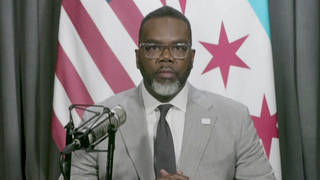
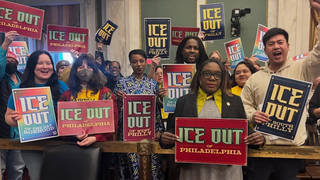
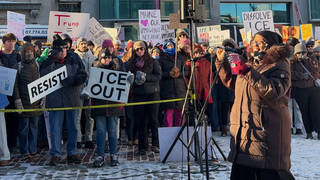






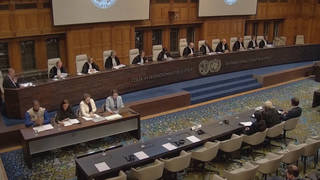

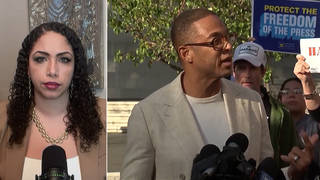
Media Options